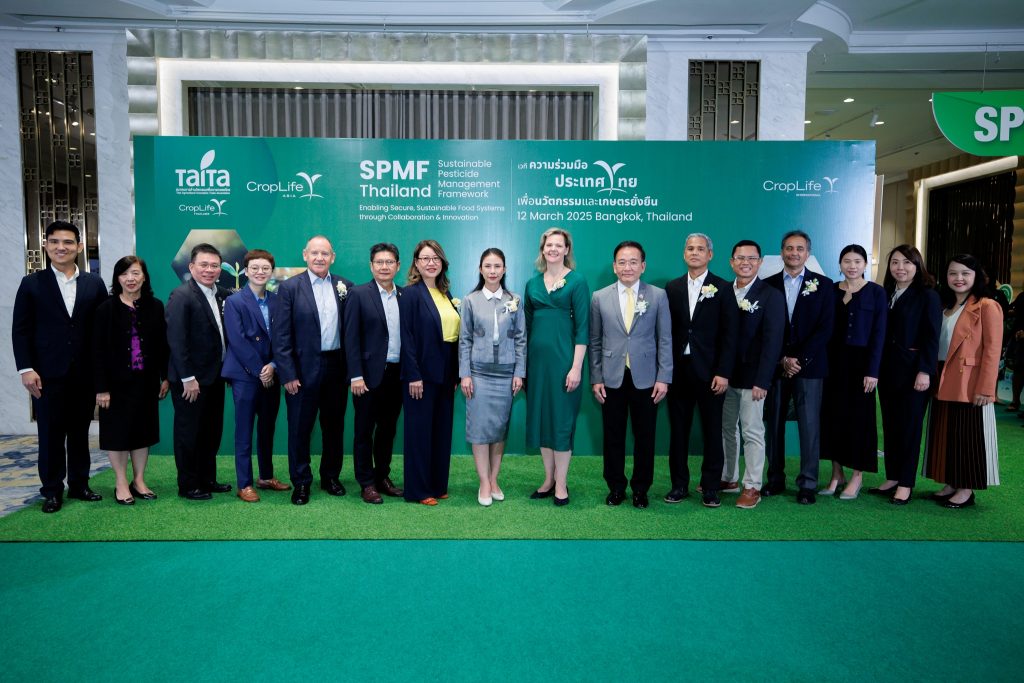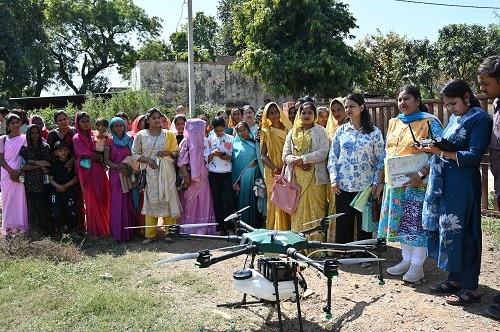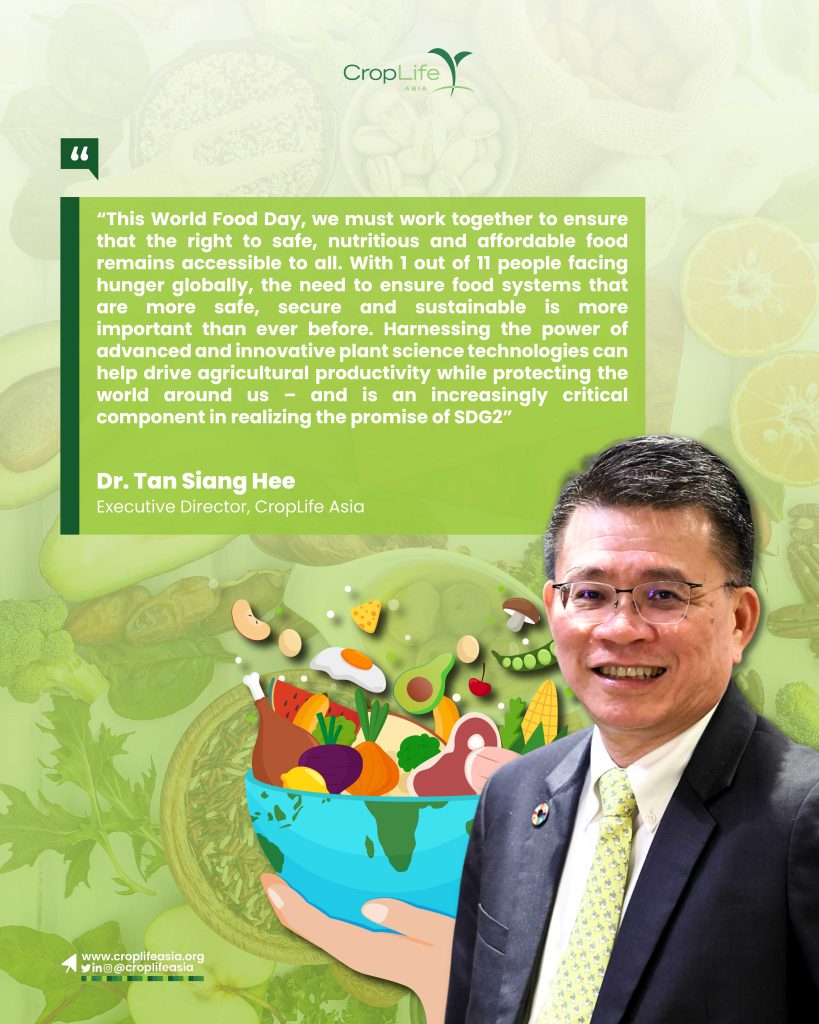Stay rooted in the latest agriculture news updates!
Australia I Bangladesh I China I India I Indonesia I Japan I Korea I Malaysia I Philippines I Pakistan I Taiwan I Thailand I Vietnam I Plant Science I Global
PRESS RELEASE
New Office Bearers Announced by CropLife Asia
CropLife Asia, the regional voice of the plant science industry, announced a new lineup for the organization’s Office Bearers within the Board of Directors. BASF Senior Vice President, Agricultural Solutions Asia-Pacific Installed as CropLife Asia President.

New framework aims to enhance Thailand’s agricultural sustainability while protecting human health through innovative farming practices and responsible crop protection. Read more…
Global News
Report Projects Boost in Demand from GM Food Market in Upcoming Years
The increasing market value of GM food is attributed to the demand for sustainable agricultural practices and food security solutions amidst massive global challenges. Read more…
United Kingdom – Precision Breeding Act progresses through Parliament
The regulations necessary to implement the Precision Breeding Act 2023 for plants in England has now been laid in Parliament and will be voted through in both Houses. Read more…
Governments agree to ease regulation of new-generation GMOs
The EU has moved a step closer to lifting controls on some genetically modified crops after diplomats in Brussels gave the green light on Friday for final talks with the European Parliament, which has already backed a proposal to split them into two categories. Read more…
Country News
Biologicals, novel approaches no match for herbicides: Outlook
CHEMICALS will remain the most sustainable and efficient primary tool for managing crop pests and weeds into the future, the ABARES Outlook heard last week. Read more…
Australia approves seed treatment to boost wheat production
Australia’s farm chemicals regulator said it has approved a product to tackle crown rot, a fungal disease that destroys several million tons of the country’s wheat and barley crops each year. Read more…
Two-day GRDC Update packs them in at Goondiwindi + PICS
The only two-day Grains Research Update held in Queensland, it is covering a range of topics, including the state of play of the Australian Pesticides and Veterinary Medicines Authority’s review of diquat and paraquat use. Read more…
Govt approves 29 new projects to combat climate change
Key initiatives include research on carbon emissions and climate-resilient agriculture in Bangladesh’s haor wetlands… Read more…
China harnesses AI to revolutionize smart breeding, crop development
At the 2025 Seed Congress held from March 20 to 23 in the city of Sanya, south China’s Hainan Province, smart breeding took center stage. Read more…
FAO representative speaks highly of China’s agricultural policies
“I think China has put in place very interesting policies to promote agricultural development.’ Read more…
Understanding China’s 2027 Rural Revitalization Plan
In January 2025, the Central Committee of the Communist Party of China and the State Council released the Rural Comprehensive Revitalization Plan (2024-2027) (the “Rural Revitalization Plan” or the “plan”), spurring efforts to grow the agriculture industry and improve conditions for residents in rural areas. Read more…
CropLife India celebrates International Women’s Day to champion Gender Equality in Agriculture
The program included a Drone demonstration of crop protection products… Read more…
India’s Push for GM Food Crops: Progress Amid Legal Scrutiny
Ahead of a fresh series of hearings in the Supreme Court next month over genetically modified (GM) food crops, the Department of Biotechnology (DBT) said there was “progress” on this front. Read more…
Jakarta aiming to ramp up soybean production
The government is looking to develop genetically modified organisms (GMO) to boost domestic soybean production and reduce imports. Read more…
Spurious seeds, pesticides worth Rs 78 lakh seized, seven held
During the investigation, it was revealed that the accused had been engaged in the illegal sale of spurious seeds and fake or expired pesticides for the last five years. Read more…
Haryana Budget Session: Bills to amend 2 central agri laws; four others passed in Assembly
These amendments aim to introduce stringent measures to curb the sale of counterfeit and substandard seeds and insecticides in the state. Read more…
Industry Stakeholders Call for Stringent Laws to Curb Counterfeiting
Industry stakeholders have called for the establishment of dedicated task forces, stricter penalties for counterfeit trade… Read more…
Shivraj and Bill Gates discussed on various topics related to agricultural and rural development
Gates Foundation’s collaboration with India’s Ministry of Agriculture has the potential to expand. India’s Agriculture Minister Shivraj Singh Chauhan and Microsoft co-founder Bill Gates discussed the issue of collaboration in the field of ….artificial intelligence, biotechnology, and climate-resilient agricultural technology… Read more…
Amid debates, Telangana and Andhra Pradesh ryots push for genetically modified crops
In the midst of an escalating national debate on the adoption of biotechnologically enhanced crops, including genetically modified (GM) crops, farmers from Telangana and Andhra have stepped forward, urging a science-based approach to policymaking and asserting their right to choose advanced agricultural technologies. Read more…
Bayer Strengthens Indonesia’s Food Security and Health with Science-Based Innovation
Bayer, a global company in the field of Life Science, reaffirms its commitment to supporting the agricultural and health sectors in Indonesia. Read more…
Agriculture Minister Andi Amran Sulaiman has signed a memorandum of understanding with the Ministry of Manpower. One key point of the collaboration is the development of 3 million hectares of rice fields and the establishment of modern agriculture clusters. Read more…
Korea deems U.S. genetically modified potato ‘suitable’ ahead of Trump tariff implementation
Korea’s Rural Development Administration (RDA) has ruled that a genetically modified potato developed by U.S. agricultural firm Simplot poses no environmental risks, clearing one of the final hurdles for its potential import. Read more…
Kang Ho-dong advocates restructuring subsidiaries and reducing rice cultivation in Korea
“We will push for high-intensity restructuring of loss-making affiliates and will reduce the burden even if it means closing them down.” Read more…
Turning to foreign seeds to boost yields
In a bid to increase their yields, some rice farmers have resorted to buying hybrid seeds from China online. Read more…
DNB advocates 5G Technology amongst farming community
Programme seeks to help farmers use 5G for precision farming & cost savings. Read more…
Ban on agrochemicals sparks fears for farming future
A proposed government ban on 12 widely used agrochemicals has triggered alarm across Pakistan’s agriculture sector as experts warn it can cripple crop yields, inflate costs for farmers and destabilise food security. Read more…
Chinese firm to set up Sino-Pak Agricultural Industrial Park, launch e-commerce platform in Urdu
Feidoodoo Cross-Border E-Commerce (Ji Nan) Co, Ltd, a subsidiary of Chinese-listed company Guolian Co, Ltd, has announced plans to establish a Sino-Pak Agricultural Industrial Park in Pakistan and introduce a cross-border e-commerce platform in Urdu. Read more…
4 Chinese nationals arrested for selling smuggled pesticides, insect repellents in Cotabato
Law enforcement agents arrested four Chinese nationals selling imported insect repellents and pesticides in an operation. Read more…
1st Solar-Powered Seed Warehouse with Cold Storage Opens in Ilocos
A solar-powered seed warehouse with cold storage and acclimatization rooms is now ready to provide rice farmers with quality seeds to boost food security. Read more…
FPA taking new approach in regulating biofertilizers
It said the new regulatory approach applies to “emerging products” such as biofertilizer, biopesticide and bio stimulants, FPA Office-in-Charge and Executive Director Glenn DC. Estrada told reporters. Read more…
DA to build 2 soil laboratories in Palawan
The Department of Agriculture (DA), through the Bureau of Soils and Water Management (BSWM) National Soil Health Program, has officially started the construction of two soil laboratories and the installation of a mobile soil laboratory in Palawan. Read more…
Harvesting hope with AgriConnect: How AI is uplifting Filipino farmers
…a revolutionary change is on the horizon thanks to AgriConnect, an AI-powered application developed by 21-year-old student, Soj Gamayon. Read more…
Taiwan to Fully Lift Ban on Beef Imports from Japan
Taiwan’s food sanitation authorities plan to fully lift a ban on beef imports from Japan, according to Taiwan’s official Central News Agency. Read more…
Thailand seeks India, Vietnam alliance to stabilise rice prices
Thailand is set to hold talks with India and Vietnam about strategies to tackle falling rice prices caused by oversupply, the Commerce Ministry said. India and Vietnam are the world’s two biggest rice exporters. Read more…
Vietnam, US boost agricultural trade
Ambassador Knapper affirmed US support for Vietnam’s sustainable development, particularly in climate change response, natural resource management, and fisheries. Read more…
Digitalizing plant quarantine to promote agricultural exports
The application of new solutions in the world on plant quarantine, for example e-Phyto – also known as Electronic Plant Quarantine Certificate, will create a great driving force to help our country further increase export turnover. Read more…
After just the first crop, the potato production model in the northern provinces achieved an average yield of 23-26 tons/ha, 8 tons/ha higher than previous crops. Read more…
Application of gene transfer technology, gene editing, breakthrough in the field of plant varieties
After more than 10 years of applying genetically modified corn in Vietnam, the socio-economic benefits for corn farmers and the improvement of farmers’ farming habits have been proven. Read more…
Vietnam and Germany have potential for cooperation on food safety
According to Deputy Minister of Agriculture and Environment Tran Thanh Nam, there is potential for multi-sectoral cooperation between Vietnam and Germany in ensuring food safety throughout the entire production chain. Read more…
Vietnam News Today (Mar. 2): Slovakia Regards Vietnam as Key Partner in Asia-Pacific
PM calls on Japanese firms to see Vietnam as strategic destination; 30 years of Vietnam-US relations: a model of reconciliation and cooperation; Vietnam, Tanzania strengthen ties on 60th anniversary; Slovakia regards Vietnam as a key partner in Asia-Pacific. Read more…
Traditional breeding falls short in boosting soybean photosynthesis
Effective dsRNAs” Combat Cucumber Mosaic Virus in Tests
Scientists unlock Wild Barley’s Genetic Secrets for sustainable agriculture
Researchers in Japan Develop Genome Editing Method that Partially Inihibits Gene Function
IRRI Launches AI-Powered Platform to Accelerate Hybrid Rice Breeding and Enhance Food Security
NBRI develops GM cotton resistant to pink bollworm
Genetic discovery puts bigger, tastier tomatoes and eggplants on the horizon
Breakthrough Enhances Biomass and Yield in Tomato Plants with Synthetic Photorespiration
‘Breakthrough’ in fight against fruit flies; Shield against biggest threat to cultivation globally
New paddy varieties in making to reduce urea use by 50%: IRRI scientist
New technology could save declining honeybee populations
Credits to the owners of the news and articles embedded on this post.



